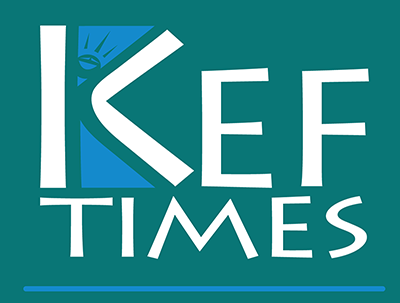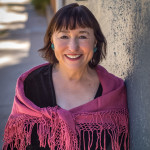In 2016 our community sent 16 individuals on scholarship to the summer Balkan Music & Dance Workshops. Scholarship types included the EEFC's Dick Crum/Kef Scholarship and the Čoček Nation, Stefni Agin, and Lillie Cooper scholarships. Click to read reports from Mendocino scholarship recipients Blythe Brooks, Kasia Kugay, Nicole Hoffschneider, Paula Peng and Ricky Oden; and Iroquois Spring recipients Nicholas Athanasatos, Bennett Clifford, Vedran Boskovski, Zora Boyadzhieva, Bethanni Grecynski, Kamen Kresnitchki, Morana Mesic, Rebecca Perlman, William Roboski and Valerie Sylvester.
To learn about applying for a scholarship for a future Workshop, visit the Scholarships page on the EEFC website.
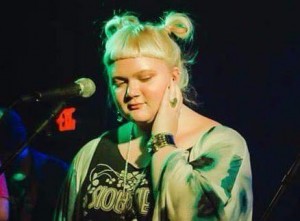
Blythe Brooks
Location: Santa Fe, N.M.
Occupation: Full-time student at Santa Fe University of Art and Design.
Connection to Balkan music/dance: Growing up, I didn’t understand my roots with the music for a long time, until I met Polly [Tapia Ferber] and was in the Balkan ensemble [at the university], but my mom used to belly dance, and I realized she exposed me to a lot of Balkan, Turkish, Armenian and other music.
Number of times at Balkan camp: This was the first, and it was amazing.
Studied at camp: I primarily studied trumpet and Bulgarian singing. I was in the brass band ensemble.
Memorable moment at camp: One night I was standing around in the dance hall and this woman just grabbed me and pulled me into a fast circle dance. It was insane, she was teaching me on the spot and we were running around in circles, doing the dance. At the beginning of the week, I was watching my feet all the time. But then there came a point when I learned not to look at my feet while I was dancing; when I looked up and saw everyone’s faces, I saw expressions of peace and joy on them. It struck me that this was really the purpose of dance—unifying people. It honestly felt kind of meditative.
Also, watching the teachers and musicians play, I was honestly overwhelmed every night. I couldn’t go to bed until everyone had finished playing; I didn’t want to miss any of it because I was in such awe at the musicians and their abilities. They seemed so effortless and natural; of course, they’d all been through a long process of learning. After I would hear my teachers play, I felt like "How do I even talk to you anymore? You’re so incredible!"
During the day when you’re running around, going to all the classes, you’re losing your mind, trying to learn all this music and theory. In the evening, you would see the music in context, you were immersed in it. I have never had such an amazing learning experience. I absorbed so much, and it has really changed the way I learn and play music.
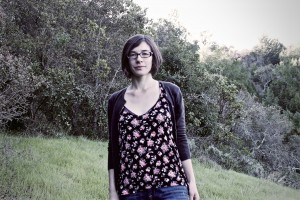
Kasia Kugay
Location: Santa Cruz, Calif.
Occupation: I’ve been managing to survive on odd jobs, from gardening to babysitting, for the majority of the last year. My main gig is performing and recording original music under the pseudonym Chicken Mama.
Connection to Balkan music/dance: I enjoy the many opportunities to experience live Balkan music in the Bay Area. I’ve taken some workshops with Kitka and have a special interest in Turkish and Georgian music, especially from the Black Sea. I incorporate some elements of Balkan music in my compositions, and am envisioning a podcast that will allow me to keep learning about traditional music from around the world while supporting that education for others.
Number of times at Balkan camp: This was the first.
Studied at camp: I was focused on taking Pontic kemençe lessons from Bob Beer, as well as Turkish and Greek singing.
Memorable moment at camp: Two of my favorite experiences at camp were induced by dance. Learning Pontic dances in the main hall on the first night was a rambunctious delight. I’d spent some time on the Black Sea the previous summer and had the luck of attending several weddings. There is one common dance that I memorized and brought home with me . . . so it was very enriching to explore more of these dances with the community at camp. An impromptu old-time flat-footing lesson in the kafana was another unexpected highlight. I’m also grateful for the precious time spent with musical peers geeking out on what we were learning and finessing Georgian harmonies for a kafana performance.
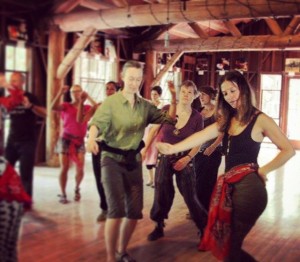
Nicolle Hoffschneider in the dance hall at Mendocino (in foreground, with red sash around waist).
Location: Oakland, Calif.
Occupation: I work a full-time day job as a marketing coordinator for one of the oldest architecture firms in the Bay Area (HKIT Architects). I also teach belly dance at ODC in San Francisco weekly on Wednesday nights from 7:45 to 9:15 p.m. and I have biweekly gigs at various hookah lounges and restaurants in San Francisco (Marrakech, Fog City Hookah). In addition, I am working as a co-director and choreographer for a San Francisco-based belly dance theater company founded by Jill Parker, (Little Egypt).
Connection to Balkan music/dance: I try to interject Balkan music and dance into my life on a daily basis. First of all, since camp, I have been listening to Balkan music almost every day. I continue to study the dances and incorporate them into my choreographies when they make sense to do so. I refer back to notes or videos from camp to help me with this and I can’t wait to go back again in the upcoming years to learn more. It’s also wonderful to live in the Bay Area and have so much going on here in terms of Balkan music and folk dancing—Ashkenaz, Balkan Sundays at Café Revolution—I try to attend shows and support the community as much as I can.
I also enjoy being on the EEFC mailing list and I am so inspired by the knowledge this community shares collectively. There should be a worldwide email list for (almost) everything—it’s really an incredible community that is out there—I have used the list to get lyrics translations or find out more about specific dances, and I am so grateful for all of you who are sharing your knowledge through the email list and keeping these dances, music and knowledge of culture alive.
Lastly, I’m hoping to travel to the Balkans in the next year or two in order to immerse myself and have a deeper understanding of various cultures, music, dances and the roots of something I’ve become so passionate about here in California. I hope to line up some teachers for various dances, and perhaps attend a festival—and definitely surround myself with music as much as possible.
Number of times at Balkan camp: This was my first time at camp. I attended three music/dance camps this year that were all wonderful, but Balkan camp may have taken the cake!
Studied at camp: I attended camp planning to exclusively take dance classes. As a dancer, this is clearly where my comfort zone lies. However, I brought a darbuka/doumbek just in case and when I got to camp, I ended up sticking around on the first day for Vlado [Pupinoski]’s ensemble class and was able to play percussion with them and perform with them at the end of the week (thanks to moral support from Michele Simon and from everybody in the group being so wonderful and welcoming). I also attended Joe [Graziosi]’s Greek dancing classes, Alex [Marković]’s dance classes, and thoroughly enjoyed studying Turkish Roman dance with Jessaiah [Zuré], who is an incredible dance teacher—and who really pushed me hard in her classes and inspired me to work harder as a dancer in this style.
Memorable moment at camp: There are too many things that touched me to just name one! I loved that camp is so open and welcoming to everybody. I didn’t expect to play in an ensemble but by the end of the week I was jamming with Vlado and his group and learning new rhythms on the darbuka that I now recognize when I hear them in Balkan tunes. I’m grateful for that opportunity because it pushed me out of my comfort zone and taught me something new.
I also love how the kafana is so open and inviting to everybody. It was a space where we could all share our creativity and music with one another—even if it was outside of the Balkan genre. It was amazing and incredibly inspiring to see the talent that came out of that space and how we transformed that little room into a special place for the week, giving it an entirely new atmosphere and energy that will always be unique to it for that one week in time—we each added to this in our own way and I’ll always have a special memory of what that space became for the week.
There are so many other things to say here, but I want to give a special shout-out to the incredible teachers that this camp brings us. You are all world-class, top-notch, incredible musicians, teachers, dancers, scholars and just awesome people. I was inspired by each and every one of you and thank you so much for taking the time to come to camp and making it such a wonderful place.
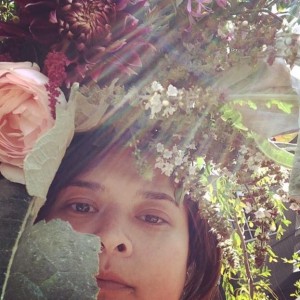
Paula Peng
Location: Los Angeles, Calif.
Occupation: Mushroom cultivator and tincturist; cooperative founder, Permaculture Design
Connection to Balkan music/dance: UCLA Bulgarian choir. World Music singing class. MJT events committee. Kypseli Greek dancing.
Number of times at Balkan camp: 2006, 2012-15
Studied at camp: Remedial santouri 😉
Memorable moment at camp: This was my first year offering something for the auction (I know, for shame!) and it was a really great experience. I decided to offer a tasting of my tinctures and although it was kind of touch-and-go, it gave me a chance to talk with a cross section of camp that I probably wouldn't have otherwise. Bringing something to offer that is the result of my personal health struggles gave me a window into the lives and passions of other Balkanophiles and ways that they are active agents of healing and change for themselves, their friends and families, as well as animals and the environment. Although perhaps 90% of us still got the post-camp virus (after all, you can't bottle sleep), it felt good to know that I brought as much as I could to help everyone get an advantage over it, and in sharing my own story, gained access to others' stories and strengths.
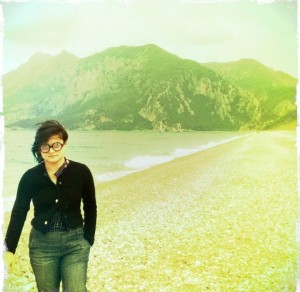
Paula at Olympos on the Antalya coast of Turkey in 2011.
One other thing that may or may not be what you want to hear from a scholar but was, to me, lovely proof of true community: Many folks know that last fall I had a terrible case of poison oak that basically overtook my entire face and body for the most of a month. It was pure hell, and there was a good week when I could barely sleep. Needless to say I was also losing my mind. Since then, I have been vigilant any time when going into nature, so coming to camp felt somewhat more fraught, as I heard each exposure can be exponentially worse. Toward the middle of the week my paranoia started to overtake me, as friends definitely were exposed to poison oak and had rashes and I was myself battling an inexplicable rash despite obsessive showers at any hour of day or night and strategic organization of clothing and bedding. Finally I decided to take the advice of several wise campers and talk to our medic, Sommer [Halligan]. Although she did give me something for the rash and advice on managing it, the compassion and empathy that she and Dr. Norm [Rosen] showed me really helped me to completely reset and reconnect with the camp experience I so love and needed.
Knowing that they and others were there and looking out for my well-being, offering resources, not only physically but as a person, even though we may travel in different circles at camp, was remarkable to me. After that point, I could come to them with elation and relief to say, "I think I have a parasite!" and feel understanding and acceptance. It turned out my cabin mate was also experiencing some itching and the rash resolved easily post-camp. Phew!
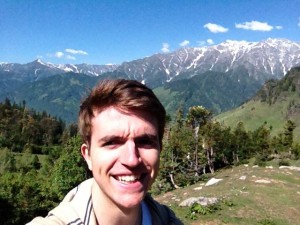
Ricky Oden
Location: I'm currently living in Sunchang, a small town in the Jeollabuk province of South Korea.
Occupation: I'm an English teacher.
Connection to Balkan music/dance: I've had the opportunity to teach my students about world music (including that of the Balkan region), and I've been fortunate enough to perform some world music in my school concert—I've done Shona mbira (a Zimbabwean lamellophone, sometimes called thumb piano), Samul nori (Korean percussion ensemble), and some Bulgarian choir with students and teachers. There is a relatively large community of musicians and artists of different nationalities in my area with whom I've tossed around the idea of doing a recurring get-together, but nothing has yet come to fruition.
Number of times at Balkan camp: This was my first time attending the West Coast camp, but I'd attended the East Coast camp the previous year.
Studied at camp: My main focuses at camp were the brass band and music theory classes.
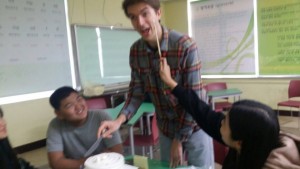
Ricky in the classroom in South Korea.
Memorable moment at camp: While writing this, I've had a pretty hard time coming up with only one impressionable moment from the camp; every day I probably experienced at least twenty! From eating breakfast huddled around the campfire, to fighting off the hordes of mosquitoes whilst attempting to comprehend maqam theory, to having my mind blown by the amazing musicians every evening, and the numerous late-night kafana conversations enjoyed over a gin and tonic (you know, for the mosquitoes). Every day seemed to be a constant stream of memorable experiences. That said, perhaps my favorite night was the lamb roast; one scene that particularly sticks out in my memory is Alex [Marković]'s cross-dressing čoček dance following his lecture. His willingness to perform in a way so contrary to our Western conceptions of normative gender roles struck me as particularly brave, and the genuine enthusiasm and participation he was met with are hard to put into words. It was a heartwarming experience, and encouraging for those also pursuing niche ethnomusicological goals (like me).
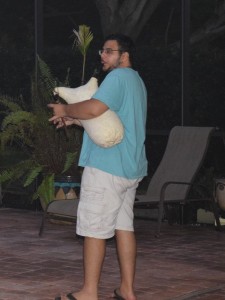
Nicholas Athanasatos
Location: Tarpon Springs, Fla.
Occupation: I currently attend school in Tampa, studying microbiology at the University of South Florida.
Connection to Balkan music/dance: I am part of the Saint Nicholas dance ministry, Levendia, dancing, performing and instructing Greek folk dance in and outside of the group. Outside of the group, I have taught dance to other dance groups as well as in conjunction with the city of Tarpon Springs.
Number of times at Balkan camp: This past summer was my first time attending Balkan camp, and it was a beyond expectations, fantastic experience.
Studied at camp: At camp, I wanted to make the most of the experience, not focusing on one thing, but attending both dance and music workshops of various cultures. If there was one thing I focused on it was the violin, which is my biggest passion.
Memorable moment at camp: The whole experience of Balkan camp is one that I will never forget. The most lasting impression is just the feeling of joy throughout the period of camp due to the constant music and dance. Also, the people and instructors I met blew my mind, probably the most enthusiastic and passionate people I have ever met, definitely my kind of people, just exuding with kefi. I cannot pinpoint one experience to call my favorite, but the scene with all the ensembles playing was a highlight of the week, especially for someone who has not had much experience playing with other musicians. The camp was an experience that I must repeat again very soon.
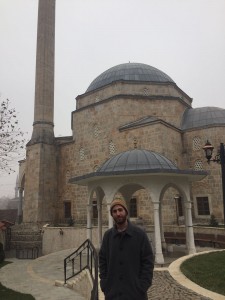
Bennett Clifford in Prizren, Kosovo, in front of Sinan Pasha Mosque.
Location: Tbilisi, Republic of Georgia
Occupation: I am a research analyst who specializes in the study of counterterrorism. I am currently working for a think tank in Tbilisi, but will be returning to the United States (Washington, D.C.) to continue working in a similar capacity.
Connection to Balkan music/dance: When I am back in my hometown, Boston, I enjoy attending the various Balkan dance events held by the Folk Arts Center of New England and other groups. Whenever I'm in a different town, I always try to find the Balkan recreational dance group. When I'm out of the country, I enjoy listening to Balkan and other types of folk music. In Tbilisi, I've loved going to Georgian folk music and singing concerts and hearing traditional music in its natural settings (usually at feasts, accompanied by copious amounts of Georgian wine).
Number of times at Balkan camp: This was my first time at camp, but hopefully not the last!
Studied at camp: I came to play çifteli in Raif [Hyseni] and Merita [Halili]'s Albanian ensemble and learn some tunes on the Macedonian tambura.
Memorable moment at camp: My parents are avid Balkan folk dancers in the Boston area and I was basically taken to events since I was in a stroller, but had never attended Balkan camp before. On behalf of a generous scholarship from the EEFC, I was finally able to attend last summer. People in Boston and D.C. who had attended for years told me that 1) I would never hear more awesome Balkan music in a one-week period than I would at Balkan camp; 2) the (in?)famous kafana parties are a marathon, not a sprint; and that 3) I would absolutely love it.
After attending camp for the first time, I can confirm that all of those reviews were 100% true. Every night, multiple all-star performers of Balkan music would play incredible sets for dancing in the main hall and the kafana. My favorites were the Pontic Greek sets, the zurla sets with Milo [Destanovski] and Jessica [Ruiz], and getting to hear younger musicians rock it out with Čoček Nation. Despite spending basically all night in the kafana every night, I was motivated to wake up to attend daytime classes taught by awesome musicians like Raif Hyseni, Milo and Jessica, and an amazing series of classes taught by one of the masters of Greek dance, Yvonne Hunt. In short, I loved every moment of Balkan camp and am itching to go back!
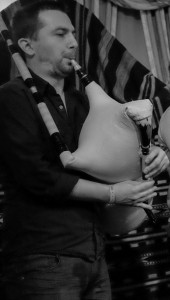
Vedran Boškovski
Location: Brooklyn, N.Y.
Occupation: I work in restaurants and do music every now and then.
Connection to Balkan music/dance: I was born in Skopje, Macedonia, so it is part of life. Everyone is around it and aware of it. I got more seriously into it, trying to learn the music and folklore, in college in my early 20s.
Number of times at Balkan camp: Three or four.
Studied at camp: I am interested in Macedonian music and playing traditional instruments: zurla, gajda, kaval. I actually got the scholarship for Mendocino and I was supposed to go there as a student, but then they asked me to teach. [Ed. note: Staff member Mark Levy had to cancel and Vedran was hired at the last minute to teach Macedonian village ensemble and Macedonian gajda.] I did take the Čalgija ensemble class. Then I attended the camp at Iroquois Springs on the scholarship.
Memorable moment at camp: In general, it’s a great time. This year at Iroquois Springs was a little better because the weather was phenomenal and I spent more time in the pool. California was also really amazing. Learning a bunch of new things, hanging with different musicians, playing a bunch of music, the food was phenomenal on both coasts. I come there with a purpose; there are really great master musicians that play great Macedonian music or Macedonian style of music, and that’s most of what I go there for. There are a lot of really amazing people. At the East Coast camp by now, I’m familiar with everyone; the West Coast camp was also very unique in its great people.
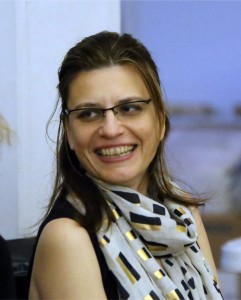
Zora Boyadzhieva
Location: New York, N.Y.
Occupation: I am an architect, working for a firm based in New York City.
Connection to Balkan music/dance: I am Bulgarian, from the Rhodope Mountains. Growing up, I was very visual and interested in other forms of art but not necessarily folklore. I discovered my interest in Bulgarian folk dancing years after I left Bulgaria, while in grad school in Cambridge, Mass. A friend at MIT had invited me to an event where Nikolay and Donka (Kolevi) and both of their daughters were performing. Martha Forsyth showed up with the Zdravets dancing group and I actually encountered the EEFC community for the first time. I was impressed with both musicians and dancers and quite surprised and intrigued by the discovery of this American community so interested in my culture. Initial curiosity gradually grew into more serious interest and eventually I started dancing with Cathie Springer’s group, Bosilek. I have been with them for 4 years already.
I am also involved with the Bulgarian cultural organization Young Bulgarian Voices New York since its creation. Initially the organization started as a language school and children’s choir. Looking for an opportunity to raise our son Kamen, who was born in the U.S.A. bilingual but also is aware of our Bulgarian cultural background, we enrolled him in the school that meets every Sunday. [Ed. note: Kamen is now 15 and also attended camp on scholarship this year; see his story here]. YBVNY is a nonprofit run by volunteers, and naturally both my husband and I got involved in the running of the organization. Over the years the needs of the growing Bulgarian community evolved and with them our organization. Today it offers a rich and engaging environment for both children and adults to learn not only the language and Bulgarian singing but also traditional dance and instruments such as kaba gajda and tupan. One of our special projects is 101 Kaba Gaidi NY, which brings together bagpipe players from all kinds of backgrounds.
Number of times at Balkan camp: This was my first year at camp.
Studied at camp: I took singing classes with Tzvetanka Varimezova (intermediate Bulgarian singing) and beginning level class with Elitsa Stoyneva as well as kaval class with Valeri Georgiev, and as many dance classes as I could fit in my schedule.
Memorable moment at camp: I very much enjoyed the time after dinner between 7:00 and 8:00 when everybody goes to their porch to rehearse and improvise.
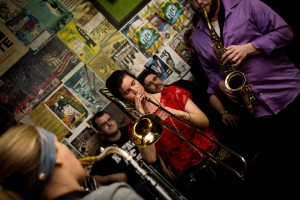
Bethanni Grecynski playing trombone.
Location: Ann Arbor, Mich.
Occupation: Musician, educator, businesswoman, secretary, band leader.
Connection to Balkan music/dance: I play trombone, sing, play Bulgarian kaval, and perform and record with the ensembles I have helped create in Ann Arbor, Mich.: Rhtya Musik and OrnâmatiK. The music we play invites the community to experience original compositions and uniquely arranged Eastern European folk music that fuses together cultural traditions with individual experiences and modern sensibilities. In addition, I rehearse regularly with a local study group, Priyateli, that I co-founded with Doug Allen and Abby Alwin, in which we continue our study of traditional Bulgarian music on traditional instruments. I am also a composer and continue to write music that is heavily influenced by immersion in Balkan music, dance and culture.
As someone who works with children, I also intersect with Balkan music and dance as a role model and teacher. I teach twelve students trombone privately and share music from Eastern Europe with them, many of whom are beginner players. I encourage performances in the schools and at local events, to share music and dance with our local community and teach open-mindedness and cultural awareness. I also nanny young children, ages toddler through pre-teen, and share Balkan music and dance with them through listening and playing, as well as simple things like oiling the Bulgarian kaval together.
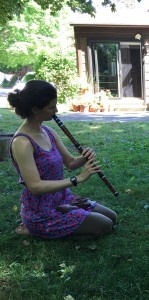
Bethanni playing kaval.
Finally, I am drafting a proposal to arrange grant money for a local Ann Arbor program that supports musicians and builds healthy relationships through an accessible, free, family-friendly weekly program that promotes mindful exercise and a range of live music, including Balkan and Congolese local artist performances.
Number of times at Balkan camp: I've been coming to camp since 2011.
Studied at camp: My main focus was Bulgarian kaval, singing, Albanian ensemble, and brass band.
Memorable moment at camp: In years past, I have been able to travel with my band, OrnâmatiK, to Balkan camp and we have performed together at kafana, the late-night performing venue and eatery at Balkan camp. This year, though, OrnâmatiK's drummer—Drew Schmieding—and I were the only two band members able to attend camp. Because I did not travel with an ensemble, I was not planning on performing at kafana. But then several people at camp asked me, "When are you performing at kafana?" and when I responded "I'm not, this year," the answer I received back was "You have to!" So I was already touched by this enthusiasm and started looking at a way to make a performance happen.
I asked many performers and teachers, as well as peers, whom I deeply respect, if they would perform together with me at kafana, and they agreed! Thus, I organized the ensemble, "Bethanol & The High Octanes," which consisted of Polly Tapia Ferber on doumbek, Raif Hyseni on accordion, Adam Good on guitar, Paul Brown on bass, Drew Schmieding on drum set, Tim Allen on saxophone, and Abby Alwin on cello. This was such a wonderful cast! I was so honored to work with such masterful artists together and deeply touched that everyone made rehearsal possible and stayed up to perform even at 3 a.m.—and my mom also drove four hours to attend the performance! It is a very heartwarming memory for me and I am so grateful to everyone who made it happen!
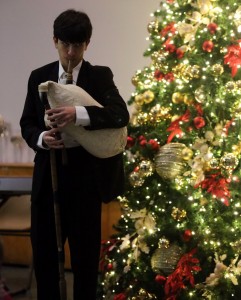
Kamen Kresnitchki
Location: New York, N.Y.
Occupation: Student, 10th grade.
Connection to Balkan music/dance: I am a member of 101 Kaba Gaidi New York, which is a project of Young Bulgarian Voices New York. I play kaba gajda. Our purpose is to preserve Bulgarian culture and spread it to a diverse audience.
Number of times at Balkan camp: This was my first time.
Studied at camp: There was not a kaba gajda class at camp this year, but there were a bunch of players, so I played with them. I also took lessons in Greek clarinet and played clarinet as part of Čoček Nation.
Memorable moment at camp: Since we had recently lost Vassil Bebelekov, all week there was organizing for a memorial. The way we all came together at the end with bagpipe playing, everybody dancing, created a general sense of unity in the face of loss. We played for over 30 minutes. Even on such a sad occasion it turned into something enjoyable and meaningful.
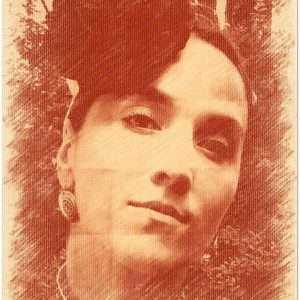
Morana Mesić
Location: New York, N.Y.
Occupation: I'm a music producer, singer and arranger. I am also involved in creative arts therapy work as a certified sound and music practitioner and a performance wellness coach. Within my publishing company I coordinate music projects that are focused on traditional Croatian music, jazz or both.
Connection to Balkan music/dance: As a performing artist, and a born-and-raised Croat, most of the work I do revolves around my culture and its music.
Number of times at Balkan camp: This was my first time.
Studied at camp: I was primarily interested in exploring this community of musicians and seeing how my culture is being taught and represented in this part of the world. And I was, naturally, very curious about finding like-minded Croatian musicians.
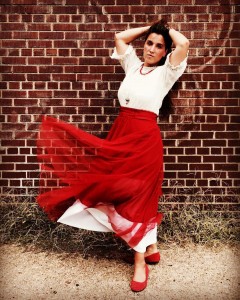
Morana Mesić
Memorable moment at camp: As I prepared for this camp in my mind I was expecting to find a community of majority Balkan-born-and-raised people such as me, but soon after arriving, I was quite surprised and impressed to find that this culture is being cherished and treasured by people who have mainly spent time as visitors in the Balkans, at least in most cases. But among them I met so many young people, under 25, who were so sincere and passionate in their desire to know more about my culture and history, and this impressed me because it showed that they are not just fetishizing our Balkan culture, but are genuinely devoted and respectful of it as they study it and perform. The questions they asked me about my country were so smart and on point and revealing of their own generosity and love.
The most touching moment, or rather, MANY moments were those that I spent sharing thoughts and songs with the amazing Bosnian singer and accordion player Mensur Hatić and his wife Mediha, as we share the same bittersweet nostalgia and homesick feelings, which only music can heal.
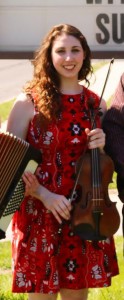
Rebecca Perlman
Location: Monticello, N.Y.
Occupation: I am an orchestra and general music teacher at an elementary school.
Connection to Balkan music/dance: My band, Madárka (Hungarian for "little bird"), plays klezmer, Hungarian and Balkan music. We play at restaurants, farmer’s markets, libraries and other venues in the Hudson Valley. I recently attended Golden Fest in Brooklyn, N.Y., where I had the chance to practice some dancing and meet up with friends from Balkan camp. It was a lot of fun.
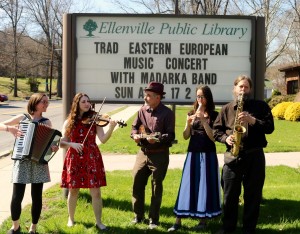
Rebecca with her band, Madarka.
Number of times at Balkan camp: This was my first time.
Studied at camp: My main focus of study at camp was to learn Balkan music on my violin. Beth [Bahia Cohen] offered Greek Island music in both her ensemble and violin class, so I mostly learned that style. I also played violin in Raif [Hyseni]’s Albanian ensemble and attended the beginning gudulka class with Ivanka [Paunova].
Memorable moment at camp: One experience that surprised/touched/impressed me was being part of a "blender band." I really enjoyed getting to know the different people in my band that I might not have otherwise had the chance to meet. We ended up playing a mix of Russian klezmer, Balkan, and Korean pop at our performance. It was refreshing and fun to work with all kinds of musicians, ranging in background, experience and age, to create something unique that we could all relate to and then have the chance to perform for an audience.
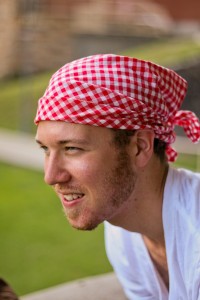
William Roboski
Location: Elkins, W.V.
Occupation: I attend Davis and Elkins College. I am a senior set to graduate in Spring 2017 and will receive a B.A. in American Vernacular Dance (the only program of its kind in the world)!
Connection to Balkan music/dance: I tour with the college's group The Appalachian Ensemble, which presents all varieties of traditional Appalachian music and dance around the East Coast. The only current opportunity I have to connect with Balkan music and dance, given my geographic location, is through brief trips to Pittsburgh or by reviewing recordings I have taken from my trip to Bosnia this past summer as well the East Coast Balkan camp 2016. Even though we have a heritage center in my town (the Augusta Heritage Center) it is a good three-hour drive to anywhere with a live Balkan atmosphere.
Number of times at Balkan camp: This last year was my first time at camp and what a gem! I cannot wait to go back.
Studied at camp: My main focus at camp was singing and I thoroughly enjoyed the Bulgarian and Greek singing courses I was blessed with. The magic of it all!
Memorable moment at camp: In particular my favorite moments were at the end of the day when I had the last session [Greek singing] class with Sandy Theodorou, when I would just let the songs ooze in and out of my heart. Maybe it was that time of day when exhaustion from the rigor of hours of listening, singing, dancing and being present lent to the warmth of the learning or maybe it was Sandy's own technique that did it, but somehow those moments in the day sealed in the song. What a trip. The fervor of it all and the many hearts of people who care about these particular traditions were astounding. (Even the zurlas grew on me.)
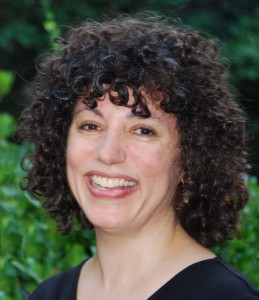
Valerie Sylvester
Location: Toronto, Ontario
Occupation: I'm a professional violinist. I play with a lot of orchestras and small ensembles and with the Niagara Symphony Orchestra. I also play Baroque violin, bass viola da gamba, and violin in an early jazz band.
Connection to Balkan music/dance: I dance with a Macedonian performing group called Zdravec and also go to international folkdance evenings whenever I can. I am also trying to learn the kaval.
Number of times at Balkan camp: This was my first time at camp.
Studied at camp: I didn't really have a main focus at camp—I did Bulgarian singing, played kaval in the Macedonian village band, and took dancing and beginning gudulka. I wanted to do even more. The frustration of not being able to do everything never left me the whole time there!
Memorable moment at camp: I LOVED every minute of camp, so it's hard to pin down one thing. I was impressed to see how many people were there at the evening dance and, before I adjusted to camp’s unique no-sleep time zone, amazed at the crowds at the kafana. I loved the intensity and familiarity of everyone’s connection to Balkan music and dance. But most of all, my mind keeps going back to the wonderful image of people practicing on cabin front porches in full hearing of other groups practicing different music on neighboring porches . . . while others sat on the steps enjoying it or taking a nap. Total chaos but passionate chaos!

